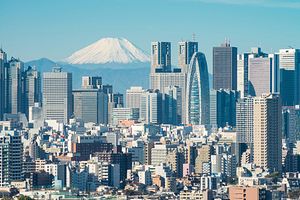Data released over the past week suggests that Japanese companies are helping to drive economic growth, with capital expenditure rising a revised 7.6 percent during the first quarter, boosting Prime Minister Shinzo Abe’s hopes of steering the country out of decades of economic stagnation. The Bank of Japan has also reaffirmed its commitment to achieving its 2 percent inflation target, with BOJ Governor Haruhiko Kuroda claiming the bank is halfway to its target.
On June 9 the Japanese government released data showing that growth for the first quarter of this year was higher than anticipated, with GDP increasing year-on-year at 6.7 percent instead of the initial estimate of 5.9 percent. That marks the sixth straight quarterly expansion, and was aided largely by consumer demand ahead of the consumption tax increase on April 1. However, capital investment also figured heavily. The initial estimates last month showed that investment in the first quarter had increased 21 percent, yet the revised numbers showed capital investment had increased 34.2 percent for the quarter, the highest growth since the third quarter of 2011.
With Abe set to unveil his latest round of structural reforms, the recent signs of economic growth could bolster support for his new policies, such as a reduction in the corporate tax rate. After meeting with his Finance Minister Taro Aso and Economy Minister Akira Amari, Abe said he would bring the tax rate from 35 percent to below 30 percent in the next few years, and that alternative government revenue streams would be identified, according to Businessweek. The impact of tax cuts on the government’s precarious fiscal situation worries some, with the BOJ’s Kuroda cautioning, “It’s an essential precondition for sustainable growth of the Japanese economy to establish a sustainable fiscal structure…” and that the BOJ had “strong hopes” the government would move steadily toward fiscal consolidation.
The surge in capital investment notwithstanding, Japanese companies have been reluctant to take on additional debt, preferring instead to tap their large cash reserves. Data compiled by Bloomberg shows that the debt-to-equity ratio (excluding insurance and financial industries) at Japanese companies fell to 0.8 times in the quarter ending March 31, the lowest level since 1960. In another notable trend linked to Japan’s dire demographics, companies are increasingly looking to invest overseas. Bloomberg’s data shows that in the last 12 months, Japanese companies acquired $68.6 billion in assets abroad, while only spending $36.1 billion in Japan.
Meanwhile, the Bank of Japan is considering maintaining a large balance sheet even after the 2 percent inflation target is reached, according to sources who spoke with the Japan Times. BOJ sources said it “would use cash from maturing securities in its portfolio to buy long-term government debt.” Since Japan began its latest round of quantitative easing in April 2013, the BOJ’s balance sheet has blown out to 52 percent of GDP. However the sources said that in order to avoid the appearance that the BOJ is simply financing government spending, any extension of debt purchases after the 2 percent inflation goal is reached would only happen after internal debate, as the plan remains contentious within the bank itself. Indeed, earlier reports indicated that there has already been discussion within the bank as to the timing of an exit from the easing program, and Kuroda has been notably more vocal recently on the need for the government to do its bit to spur economic growth.
For now, though, the BOJ said it would continue to “expand the monetary base at a pace of 60 trillion yen ($588 billion) to 70 trillion yen per year.” Koruda said the policy will continue until the inflation target is achieved and stable. A Bloomberg survey reports that 42 percent of the economists it polled expect the BOJ to boost stimulus in October, while 58 percent expect it will happen by the end of the year.
Inflation rose to 1.5 percent in April, after the effect of the consumption tax increase was considered, and businesses now seem to be investing, at least for the time being. That is good news for Abenomics, but a shrinking domestic market associated with population decline will eventually force companies to focus their efforts on expanding into higher growth markets abroad. Government plans to stabilize the population, possibly through expanded immigration, remain very nascent. The specifics regarding that aspect of Abe’s reform policy will also be revealed this month, and will give a clearer indication of the prospects of longer term stability and economic growth.
































